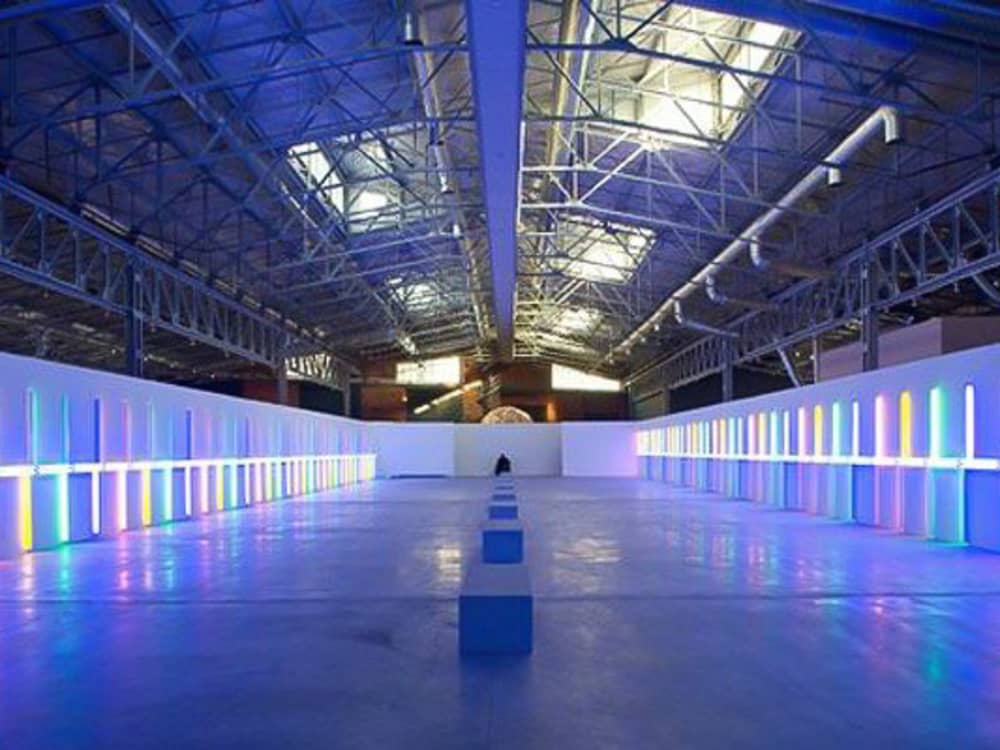Rare Birds
Haunting photographs that are true to the eye: See Houston artist Mark Chen'srevolutionary work
 Mark Chen, Sugar Factory
Mark Chen, Sugar Factory Mark Chen, Power Plant, Arizona
Mark Chen, Power Plant, Arizona Mark Chen, Downtown Houston
Mark Chen, Downtown Houston Mark Chen, Glacier Point, Yosemite
Mark Chen, Glacier Point, Yosemite Photographer Mark ChenCourtesy Photo
Photographer Mark ChenCourtesy Photo
Houston photographer Mark Chen took some time out of his schedule to give me an informal walk through of his current show, The World: Landscapes and Cityscapes, now showing through April 29 at Sculptures By Design Art Gallery. The gallery is one of many here in Houston participating in FotoFest's 2012 Biennial.
This year marks the 14th such biennial of photography and photo-related art presented by the Houston-based non-profit arts and education organization — and pictures like Chen's show why it matters.
As it always is with photography, reproductions on the Internet or in the pages of catalog are one thing, but seeing the work in person, with your own eyes, is a whole other experience.
"Our eyes are very adaptive," Chen explains. "If something is bright, the pupil shrinks, and vice versa. The camera doesn't do that. It just measures the average."
Through the magic of the photography software Photoshop, a technique called "bracketing," and paying meticulous attention at the time of a shoot to the natural light, Chen's majestic, mysterious landscapes, and chilling, skewed glass and metal cityscapes, are as close as a viewer can possibly get to being at the site of a shoot and seeing the subject with Chen's own eyeballs.
"Our eyes are very adaptive," Chen explains. "If something is bright, the pupil shrinks, and vice versa. The camera doesn't do that. It just measures the average."
The final prints are closer to what Chen actually saw at the time of the shoot than what his camera initially captured.
During my walk through, Chen asked me if I had a favorite among his photos on display. I immediately pointed to a photo titled "Power Plant, Arizona." It's a powerful image.
In the near distance, across a flat expanse of Arizona desert, humming in rich, earth tones, gray and black smoke released by the smokestacks of a power plant rises to match the colors of the cloud cover above. The sun is nearly masked by both the clouds and pollution.
It's a cliché to say this, but the image is beautiful — and disturbing. Maybe there's a way to describe it that includes a broader range of emotional responses. Or maybe I'm just reading too much into it.
Chen says he has two major interests: the wild and natural, and the purely artificial, that is, environments solely created by humans yet, as in his photos of downtown Houston, eerily empty of the physical presence of those humans. He told me "Power Plant, Arizona," as well as another image titled "Sugar Plant" (included in the slideshow for this column), is actually a new direction for him.
Chen, a 22-year resident of Houston, is very interested in downtown's architecture and mix of different skyscrapers. He finds the skyline "beautiful," and wants to shoot more of it. But as a child, born and raised in Taipei, Taiwan, Chen had no interest in that city's architectural congestion and chaos. And tellingly, one of the first things he photographed was the moon.
At the age of 14, Chen borrowed a camera from a friend, simply because he found the device intriguing, and attached it to a telescope so he could photograph the sky at night.
This hands-on inventiveness has served Chen, who has no formal training in photography, throughout his artistic career. We talked a bit about digital software, and the fact that as incredibly helpful and versatile as these tools are, the quality of the resulting work lies in the creativity of the artist who uses them. I told Chen that when I first installed and started using the popular music software program Ableton Live, I immediately realized that its potential included the power to make everyone who uses it sound completely identical.
This hands-on inventiveness has served Chen, who has no formal training in photography, throughout his artistic career.
The time and effort you put into using such a program, is what you get back. But maybe all of the arts are like this.
Chen's wife Olive is the cellist for Houston's Trio Oriens, a classical ensemble I wrote about last November. Music is an integral part of the Chen household, and has been a part of some multi-media collaboration between Mark and pianist and composer Hsin-Jung Tsai. A recent video titled Orchid combines Chen's animated photographs of calligraphy as painted by his mother Shiaw-Lan Chen with a beautiful composition by Hsin-Jung performed by Trio Oriens pianist I-Ling Chen.
A friend of mine, a fine jazz guitarist, probably describes the video best: "This is complete."
Next up for Chen is a trip to Boston and New York City. He'll spend two days photographing Grand Central Terminal, including its chandeliers and the brass handles of the rails of its stairways. I'm guessing the ceiling of the main concourse of Grand Central, which depicts an evening sky and includes the signs of the zodiac as they appear in the stars, will catch Chen's eye as well.
The World: Landscapes and Cityscapes is at Sculptures by Design through April 29. Gallery hours run from 11:30 a.m. to 3 p.m. Tuesdays through Fridays or by appointment (713) 623-0550.

